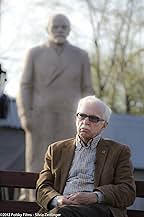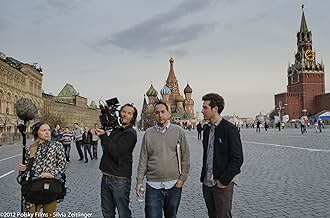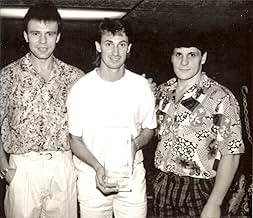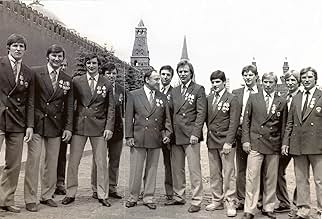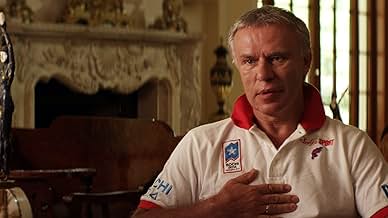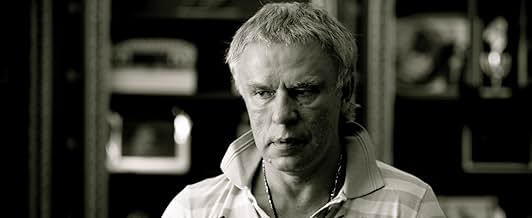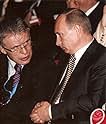VALUTAZIONE IMDb
7,6/10
7338
LA TUA VALUTAZIONE
Aggiungi una trama nella tua linguaThe story of the Soviet Union's famed Red Army hockey team through the eyes of its players.The story of the Soviet Union's famed Red Army hockey team through the eyes of its players.The story of the Soviet Union's famed Red Army hockey team through the eyes of its players.
- Premi
- 5 vittorie e 11 candidature totali
Viacheslav Fetisov
- Self
- (as Slava Fetisov)
Herb Brooks
- Self - US Olympic Coach
- (filmato d'archivio)
- (voce)
Don Cherry
- Self - Hockey Commentator
- (filmato d'archivio)
- (voce)
Recensioni in evidenza
Greetings again from the darkness. You need not be a hockey fan to be familiar with the "Miracle on Ice" upset of the seasoned Russians by the upstart Americans at the 1980 Olympics in Lake Placid. Often referred to as a battle of cultures – "our way vs their way, capitalism vs communism" – most articles, TV shows, and movies have been presented from the American perspective. It's only now, in this informative and entertaining documentary from filmmaker Gabe Polsky, that we gain some insight into the Russian players and their way of life.
Mr. Polsky is the son of Russian immigrants, and grew up playing hockey in Chicago and later for Yale. His research into Russian hockey evolved into a documentary that blends sports, geopolitics, history, culture, and personal stories. He mixes in some fantastic archival film footage from the 1970's and 80's, but the heart of everything here flows from the interviews with Russian hockey legend Vyacheslav Fetisov, who is a vital and unique link to past and present.
Fetisov is sometimes playful and sometimes snide in his remarks, but he basically narrates the history of Russian hockey – starting with Stalin's founding of the organization, through the two key coaches: father figure Tarasov and the militant Tikhanov who followed. Stalin was convinced that Russian domination of global sports would clearly establish communism and the Russian culture as far superior to capitalism and the carefree ways of the west. This led to the Red Army hockey camps being run by the military. The players were isolated for eleven months each year, training and playing in a manner that generated ultimate teamwork, but also quite unhappy young men.
We see the influence of Russian chess (Karpov) and the Bolshoi ballet for training methods, and we also see the ever-present KGB ensuring no "escapes", or what we might know better as defections. We learn about the Russian Five (including Fetisov) who were so dominant that the team went two years without losing. Gold medals in Sarajevo (1984) and Calgary (1988) occurred just prior to the 1991 dissolution of the U.S.S.R. and the economic crisis of the region.
This is what opened the door for Russian hockey players to enter the NHL, though the transition was smoother for some than others. After a few years of adjusting, it was coach Scotty Bowman's 1997 Detroit Red Wings that won the Stanley Cup with a contingency of Russian players (including Fetisov) who were given free reign to play their own game while on the ice. Their movements and intricate teamwork clashed mightily with the individualistic style of westerners and that group of Russian players can be credited with helping the game to evolve to its current style.
Much of the insight comes from the faces of the men who are interviewed. Their stoicism and lack of emotion is a microcosm of the society in which they were raised. Their country was obliterated by war, and then led by a megalomaniac who wanted to rule the world. Human emotion and the rights of individuals mattered little, and we see that despite the years of hardship, these players remain (mostly) true and loyal to their country. This is a fascinating look at human nature and how the culture of one's youth can directly impact the beliefs as an adult, so many years later.
Mr. Polsky is the son of Russian immigrants, and grew up playing hockey in Chicago and later for Yale. His research into Russian hockey evolved into a documentary that blends sports, geopolitics, history, culture, and personal stories. He mixes in some fantastic archival film footage from the 1970's and 80's, but the heart of everything here flows from the interviews with Russian hockey legend Vyacheslav Fetisov, who is a vital and unique link to past and present.
Fetisov is sometimes playful and sometimes snide in his remarks, but he basically narrates the history of Russian hockey – starting with Stalin's founding of the organization, through the two key coaches: father figure Tarasov and the militant Tikhanov who followed. Stalin was convinced that Russian domination of global sports would clearly establish communism and the Russian culture as far superior to capitalism and the carefree ways of the west. This led to the Red Army hockey camps being run by the military. The players were isolated for eleven months each year, training and playing in a manner that generated ultimate teamwork, but also quite unhappy young men.
We see the influence of Russian chess (Karpov) and the Bolshoi ballet for training methods, and we also see the ever-present KGB ensuring no "escapes", or what we might know better as defections. We learn about the Russian Five (including Fetisov) who were so dominant that the team went two years without losing. Gold medals in Sarajevo (1984) and Calgary (1988) occurred just prior to the 1991 dissolution of the U.S.S.R. and the economic crisis of the region.
This is what opened the door for Russian hockey players to enter the NHL, though the transition was smoother for some than others. After a few years of adjusting, it was coach Scotty Bowman's 1997 Detroit Red Wings that won the Stanley Cup with a contingency of Russian players (including Fetisov) who were given free reign to play their own game while on the ice. Their movements and intricate teamwork clashed mightily with the individualistic style of westerners and that group of Russian players can be credited with helping the game to evolve to its current style.
Much of the insight comes from the faces of the men who are interviewed. Their stoicism and lack of emotion is a microcosm of the society in which they were raised. Their country was obliterated by war, and then led by a megalomaniac who wanted to rule the world. Human emotion and the rights of individuals mattered little, and we see that despite the years of hardship, these players remain (mostly) true and loyal to their country. This is a fascinating look at human nature and how the culture of one's youth can directly impact the beliefs as an adult, so many years later.
When we first meet Viacheslav Fetisov in the opening scene of "Red Army", he rather surprisingly gives his interviewer the middle finger. He's not going to be hurried - he's already seen everything; been everywhere and done it all to be rushed by some kid from California (or was it Chicago?) making a documentary about ice hockey. If he has to sort out some personal business by way of a phone call before he gets into the nitty-gritty of his life story, then he will.
This is all before he has even uttered a word of genuine substance. By the time he has stopped speaking, and the film has ended with his life as it was in aftermath of the 2014 Winter Olympics, we have surely been moved by a quite stupendous narrative depicting one man's journey through the very heart of the Russian ice hockey system at a time when it was looked upon by the Communist ideologues in the 1970's and 80's as a bulwark for internationalist reputation.
There is not, of course, any correlation between sporting success and kind; prosperous societies which are worth living in, but it is, as George Orwell once attempted to convey in a work which unfolded in a mock-USSR setting, the case that something certainly becomes true when enough people believe it - irrespective of whether that thing is true in reality.
Despite their terrifying nature, societies (and films about these societies) along the lines of the Soviet Union are, for whatever reason, often morbidly fascinating - more so once we know they have disbanded and can gawp on in awe at what life was like within them: don't tell me you've never found a documentary about Nazi Germany absorbing, or even more recently a programme about a television crew who were escorted around North Korea by government supervisors. "Red Army" is, in one sense, a piece along these lines, but it is predominantly more interested in the historical story of the development of Russian ice hockey to such an extent it became all but invincible, and the aftershock of the programme which it had on other ice hockey playing nations.
Going on what I read from those who lived there, the Soviet Union was not a good place to be: people were poor, but power brought you the privilege of a nice apartment and good healthcare; government officials were corrupt and could be bribed quite easily. The skylines were desolate and grey, scarred by buildings beyond repair. It was a society of lies and corruption, not one of peace; love; progress and equality. Its saddest story is the tale of young Pavlik Morozov, who grassed to the Stalinist authorities the fact his parents were hoarding grain. His parents were killed, and a statue went up in a town square of the boy who was seen as an example to all. The odd nature of the country and how its rulers secretly knew it was a bad place to be is nicely captured via a short story therein the documentary, which recalls how KGB agents would confiscate the passports of hockey players in order to prevent defections once they had arrived at their foreign destination. Why would anyone want to defect from the Soviet paradise?
The country's ice hockey, however, eventually became second to none and "Red Army" is the retrospective documentation of the process which had this come to be; a quite brilliant voyage through the Soviet system told from the perspective of many of the players involved in the team in conjunction with one or two supporting acts who played witness to the whole thing. Agonisingly, we are robbed of input from Viktor Tikhonov, the coach of the Soviet team whose team waltzed to so many gold medals and whose nerves must have been shredded every match as the weight of both his nation's ideology and standing bear down on him. Agonisingly, he died shortly after the release of the documentary anyway.
The documentary is expertly put together by, of all people, an American by the name of Gabe Polsky, who depicts how no one had played ice hockey before what the USSR brought to the game in the 1970's. It depicts them using the somewhat obscure combination of the rhythm of ballet and the tactical nous of chess to create a team which blasts their way into greatness, winning the vast majority of their finals and seemingly spoiling the lofty opinions certain western powerhouses had of themselves in the process. Do not let the tough nature of the sale put you off - this combination of the Soviet Union and ice hockey wrapped up into a documentary package works really well.
This is all before he has even uttered a word of genuine substance. By the time he has stopped speaking, and the film has ended with his life as it was in aftermath of the 2014 Winter Olympics, we have surely been moved by a quite stupendous narrative depicting one man's journey through the very heart of the Russian ice hockey system at a time when it was looked upon by the Communist ideologues in the 1970's and 80's as a bulwark for internationalist reputation.
There is not, of course, any correlation between sporting success and kind; prosperous societies which are worth living in, but it is, as George Orwell once attempted to convey in a work which unfolded in a mock-USSR setting, the case that something certainly becomes true when enough people believe it - irrespective of whether that thing is true in reality.
Despite their terrifying nature, societies (and films about these societies) along the lines of the Soviet Union are, for whatever reason, often morbidly fascinating - more so once we know they have disbanded and can gawp on in awe at what life was like within them: don't tell me you've never found a documentary about Nazi Germany absorbing, or even more recently a programme about a television crew who were escorted around North Korea by government supervisors. "Red Army" is, in one sense, a piece along these lines, but it is predominantly more interested in the historical story of the development of Russian ice hockey to such an extent it became all but invincible, and the aftershock of the programme which it had on other ice hockey playing nations.
Going on what I read from those who lived there, the Soviet Union was not a good place to be: people were poor, but power brought you the privilege of a nice apartment and good healthcare; government officials were corrupt and could be bribed quite easily. The skylines were desolate and grey, scarred by buildings beyond repair. It was a society of lies and corruption, not one of peace; love; progress and equality. Its saddest story is the tale of young Pavlik Morozov, who grassed to the Stalinist authorities the fact his parents were hoarding grain. His parents were killed, and a statue went up in a town square of the boy who was seen as an example to all. The odd nature of the country and how its rulers secretly knew it was a bad place to be is nicely captured via a short story therein the documentary, which recalls how KGB agents would confiscate the passports of hockey players in order to prevent defections once they had arrived at their foreign destination. Why would anyone want to defect from the Soviet paradise?
The country's ice hockey, however, eventually became second to none and "Red Army" is the retrospective documentation of the process which had this come to be; a quite brilliant voyage through the Soviet system told from the perspective of many of the players involved in the team in conjunction with one or two supporting acts who played witness to the whole thing. Agonisingly, we are robbed of input from Viktor Tikhonov, the coach of the Soviet team whose team waltzed to so many gold medals and whose nerves must have been shredded every match as the weight of both his nation's ideology and standing bear down on him. Agonisingly, he died shortly after the release of the documentary anyway.
The documentary is expertly put together by, of all people, an American by the name of Gabe Polsky, who depicts how no one had played ice hockey before what the USSR brought to the game in the 1970's. It depicts them using the somewhat obscure combination of the rhythm of ballet and the tactical nous of chess to create a team which blasts their way into greatness, winning the vast majority of their finals and seemingly spoiling the lofty opinions certain western powerhouses had of themselves in the process. Do not let the tough nature of the sale put you off - this combination of the Soviet Union and ice hockey wrapped up into a documentary package works really well.
"Ninety percent of hockey is mental and the other half is physical." Wayne Gretsky
In Gabe Polosky's expert documentary, Red Army, the understanding of modern Russian hockey history filters through the influence of legendary coach Anatoly Tarasov. He taught young and old about how to play hockey like chess layered over with the best of communist collectivist philosophy—a blueprint for world-class teamwork dominance from 1954-91.
The star of this doc is Vyacheslav Fetisov ("Slava"), whose play, along with four other Russian teammates, dominated world hockey for years. His face full of character in middle age, his understanding of human nature, and his devotion to the best of what Russia could offer make for no-bathroom-break-allowed drama. His defection that results in losing his best friend, Kasatonov, is the stuff of real-life drama. Yes, there are arresting shots of hockey that seem more like perfect video games than the real-live action they are, but it's the humanity that make this film outstanding.
Slava is central-casting smart and handsome carrying an abiding love of the motherland conflicting with a heightened sense of things going wrong after the Cold-War halcyon days. To hear him extol the spirit of collective achievement is to put in relief our emphasis on individuality, for its strengths and weaknesses. Polosky does not belabor the good and bad of the competing systems but rather presents the victories and defeats as a matter of history and politics: "Draw your own conclusions," he might say.
That classic documentary "lack of bias" sometimes is frustrating. For instance, I would like to know how much of either ideology—American vs. Russian—plays in the "miracle" of the USA win at the 1980 Olympics in Lake Placid. Did the invulnerable Russian five suffer from their dislike of new coach Tikhonov's dictatorial ways (e.g., he wouldn't let a player leave to see his dying father!)? I need to go back, I guess, to another great doc, Miracle (2004), to see Kurt Russell play the legendary Herb Brooks and his victorious USA Olympic team. I suspect the reason for the Russian failure will be less apparent than the American victory.
I am nitpicking here because overall the film is exemplary historical reporting without forcing inferences about facile conjunction. Even if you're not a hockey fan, you'll delight learning about truly great players who came to America, eventually living the dream but not without a rocky adjustment as they learned to love individualism in a new country that didn't accept them as graciously as I would have expected.
See Red Army and be uncomfortably embarrassed. They were good guys.
In Gabe Polosky's expert documentary, Red Army, the understanding of modern Russian hockey history filters through the influence of legendary coach Anatoly Tarasov. He taught young and old about how to play hockey like chess layered over with the best of communist collectivist philosophy—a blueprint for world-class teamwork dominance from 1954-91.
The star of this doc is Vyacheslav Fetisov ("Slava"), whose play, along with four other Russian teammates, dominated world hockey for years. His face full of character in middle age, his understanding of human nature, and his devotion to the best of what Russia could offer make for no-bathroom-break-allowed drama. His defection that results in losing his best friend, Kasatonov, is the stuff of real-life drama. Yes, there are arresting shots of hockey that seem more like perfect video games than the real-live action they are, but it's the humanity that make this film outstanding.
Slava is central-casting smart and handsome carrying an abiding love of the motherland conflicting with a heightened sense of things going wrong after the Cold-War halcyon days. To hear him extol the spirit of collective achievement is to put in relief our emphasis on individuality, for its strengths and weaknesses. Polosky does not belabor the good and bad of the competing systems but rather presents the victories and defeats as a matter of history and politics: "Draw your own conclusions," he might say.
That classic documentary "lack of bias" sometimes is frustrating. For instance, I would like to know how much of either ideology—American vs. Russian—plays in the "miracle" of the USA win at the 1980 Olympics in Lake Placid. Did the invulnerable Russian five suffer from their dislike of new coach Tikhonov's dictatorial ways (e.g., he wouldn't let a player leave to see his dying father!)? I need to go back, I guess, to another great doc, Miracle (2004), to see Kurt Russell play the legendary Herb Brooks and his victorious USA Olympic team. I suspect the reason for the Russian failure will be less apparent than the American victory.
I am nitpicking here because overall the film is exemplary historical reporting without forcing inferences about facile conjunction. Even if you're not a hockey fan, you'll delight learning about truly great players who came to America, eventually living the dream but not without a rocky adjustment as they learned to love individualism in a new country that didn't accept them as graciously as I would have expected.
See Red Army and be uncomfortably embarrassed. They were good guys.
I came away from this movie deep in thought, trying to piece together the personal journeys of the cast, the context of life in the USSR, the changes and resulting impact upon the players lives.
This documentary is well researched and highly viewable, it is not just a male only film.
Women get to see stripped to the bare bone, deep male team bonding, open responses to complex relationships and real meaning as to how 5 men dominated a sport in the USSR and the Americas.
The death of one of the cast members shortly after the movie added a melancholy touches, yet there is humour from both Gabe Polsky and Vyacheslav Fetisov.
It was clever, I see this documentary staying around for some time, certainly one to watch again.
This documentary is well researched and highly viewable, it is not just a male only film.
Women get to see stripped to the bare bone, deep male team bonding, open responses to complex relationships and real meaning as to how 5 men dominated a sport in the USSR and the Americas.
The death of one of the cast members shortly after the movie added a melancholy touches, yet there is humour from both Gabe Polsky and Vyacheslav Fetisov.
It was clever, I see this documentary staying around for some time, certainly one to watch again.
Sometimes sports can seem like they have a bloated sense of self-importance but it can resonate in the grand scheme of geopolitics. The Cold War was indeed an era of tension and it manifested itself most publicly when the Soviet Union brought its teams to North America. It wasn't just teams representing countries, but they were representing ways of life - America, the capitalist way of life, and the Soviet Union, the communist way of life. And ostensibly, those lifestyles determine who has the better players, at least that's what they wanted the teams to think. When you hear that a country has beaten Canada at hockey, you know that means business. However, the documentary Red Army shows how the Soviet Union team members, who are all world class athletes, become disenchanted with their leadership and are recruited over to American leagues.
As expected, the attitude of the Russians today in the interviews are amusing and intimidating. Director Gabe Polsky feeds off the candid moments he captures, even if that results in the participants condescending him. With very deliberate motions with the camera, he capitalises on moments that other directors would have considered an outtake. There's a sense of humour and a sense of danger constantly bubbling, and Polsky's collection of archive footage always perfectly illustrates the portrait that the anecdotes form. It shows a skill in hockey that I've never seen before and Polsky makes it quite poetic at times. However sometimes its drama is too boisterous, but it's only real crux is that with such a big team it's hard for it to stay focused and follow all its characters at once. While it's most likely drenched in bias coming from an American, but pushing politics aside, it's the individual lives that matter.
8/10
As expected, the attitude of the Russians today in the interviews are amusing and intimidating. Director Gabe Polsky feeds off the candid moments he captures, even if that results in the participants condescending him. With very deliberate motions with the camera, he capitalises on moments that other directors would have considered an outtake. There's a sense of humour and a sense of danger constantly bubbling, and Polsky's collection of archive footage always perfectly illustrates the portrait that the anecdotes form. It shows a skill in hockey that I've never seen before and Polsky makes it quite poetic at times. However sometimes its drama is too boisterous, but it's only real crux is that with such a big team it's hard for it to stay focused and follow all its characters at once. While it's most likely drenched in bias coming from an American, but pushing politics aside, it's the individual lives that matter.
8/10
Lo sapevi?
- Citazioni
(voice): [confused] Wait a second. Go Back. I don't get why Yazov let you leave the country, if he was mad at you.
Viacheslav Fetisov: I'm not a historian. My feeling was the country tried to change something, because it's Perestroika time, but he doesn't want changes. Everybody was afraid. It's understandable. It's like in a dark room, trying to find a dark cat. It's not funny.
[still confused]
(voice): Okay.
- ConnessioniFeatured in Docventures: Urheilu (2015)
I più visti
Accedi per valutare e creare un elenco di titoli salvati per ottenere consigli personalizzati
- How long is Red Army?Powered by Alexa
- Bluray Release Date
Dettagli
- Data di uscita
- Paesi di origine
- Sito ufficiale
- Lingue
- Celebre anche come
- Красная армия
- Azienda produttrice
- Vedi altri crediti dell’azienda su IMDbPro
Botteghino
- Lordo Stati Uniti e Canada
- 694.600 USD
- Fine settimana di apertura Stati Uniti e Canada
- 20.100 USD
- 25 gen 2015
- Lordo in tutto il mondo
- 798.680 USD
- Tempo di esecuzione1 ora 24 minuti
- Colore
- Proporzioni
- 1.85 : 1
Contribuisci a questa pagina
Suggerisci una modifica o aggiungi i contenuti mancanti








